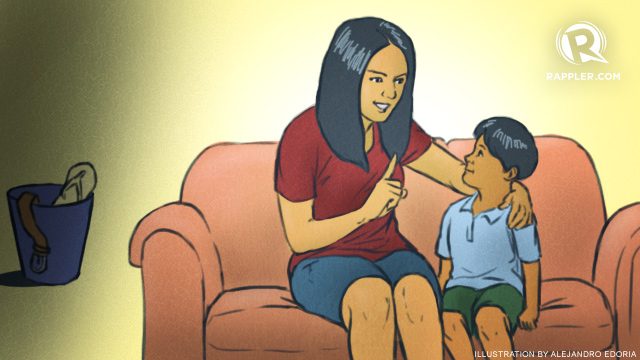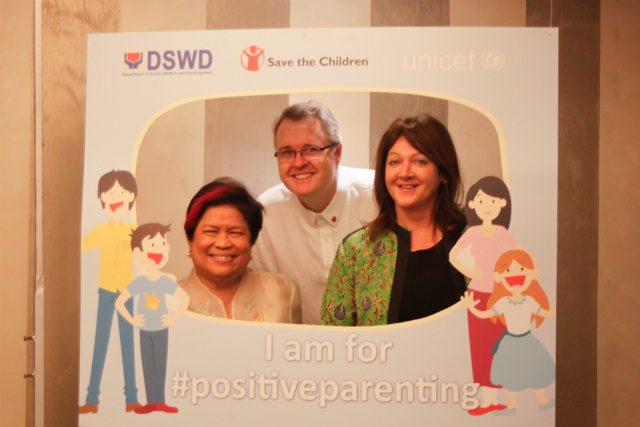SUMMARY
This is AI generated summarization, which may have errors. For context, always refer to the full article.

MANILA, Philippines – The Department of Social Welfare and Development (DSWD) together with the United Nation Children’s Fund (UNICEF) on Friday, May 8, encouraged parents to practice positive parenting on children.
According to the DSWD, corporal punishment includes any physical, humiliating and degrading forms of punishment given to children as a penalty for an offence or mistake. It involves the use of force, power, authority or intimidation to inflict some pain or discomfort on the child for the purposes of training and control.
In the Philippines, a 2011 Pulse Asia Survey revealed that two in 3 Filipino parents use corporal punishment to discipline children 16 years and below.
Meanwhile, a study conducted by Save the Children in 2005 found that 85% of children said that they were punished in the home while 82% said they were hit on the different parts of the body.
Unfortunately, there is no adequate protection for children from corporal punishment despite legal framework on child protection. The Positive Discipline Bill, filed by Senator Pia Cayetano, is yet to go through public hearing after being passed on 3rd reading.
Positive Discipline
According to Social Welfare Secretary Corazon Juliano-Soliman, non-violent type of discipline helps develop the full potential and self-respect of their offsprings.
“Parents should be made aware about the harmful effects of resorting to violent forms of discipline on children,” she emphasized.
Violent forms of punishment such as emotional violence, deliberate humiliation, and degrading treatment make children “lose their dignity and harbor deep-seated trauma and a negative perception of themselves.” (READ: Study shows spanking boosts odds of mental ilness)
Instances of violent punishments include hitting with the hand or with implements, pinching, kicking, and kneeling on pebbles or salt, forcing them to ingest substances, cursing, shaming, threatening, degrading, belittling, and verbal assault.

By raising children through a more positive approach, they grow to be more happy, healthy, and well-adjusted, Margaret Sheehan of UNICEF Philippines said.
“Taking a positive discipline approach respects children’s dignity and their right to development, participation, and protection,” she explained. “It helps to guide their behaviour and can offer long term solutions to children’s self-discipline and own life skills.”
The effects of positive parenting, among others, are: Clear and consistent communication between parents and child, a mutual respectful relationship, life-long skills and love for learning, and increase in children’s confidence and competence.
“Parenting is a privilege, in which we get to reap the benefits every day, from a simple hug, kiss, and ‘I love you,’” Save the Children Country Director Ned Olney said.
However, this can easily tip to the side of anger, frustration, confusion, and helplessness.
When there is a sudden misbehavior of child, it is when parents ask themselves “Why is my children acting in this way?” According to Olney, it’s at this point where the disciplining approach matter.
“It is when parents have to make difficult decisions,” he explained. “These decisions are on how we equipt our children to be the best version of themselves and decisions on how we as parents can be the best parents that we can be.”
Dangers of corporate punishment
According to World Health Organization (WHO), corporal punishment “kills thousands of children each year, and handicaps many more. In the long term, it is a significant factor in the development of violent behaviour, and it is associated with other problems in childhood and later life.”
To prevent this, Olney said that parents must ask themselves if their action will make their children better in the future.
“Do we think that hitting our children makes them more kind, honest, and hardworking?” he said. “Are we absolutely convince that this is the way to nurture better human beings?”
A violent approach on parenting causes lifelong negative effects on children. They are going to bring that into their adulthood and the cycle will go on, he said. “What one learns in childhood, one takes in adulthood,” Olney emphasized.
Parents must know better options in educating their children.
“Let us teach our children to express their feelings in a positive way and teach them to be honest with their frustrations and let us discipline and educate them using positive techniques,” he said. – Rappler.com
Marlly Bondoc is a student at the De La Salle University and a Rappler intern.
Add a comment
How does this make you feel?
There are no comments yet. Add your comment to start the conversation.